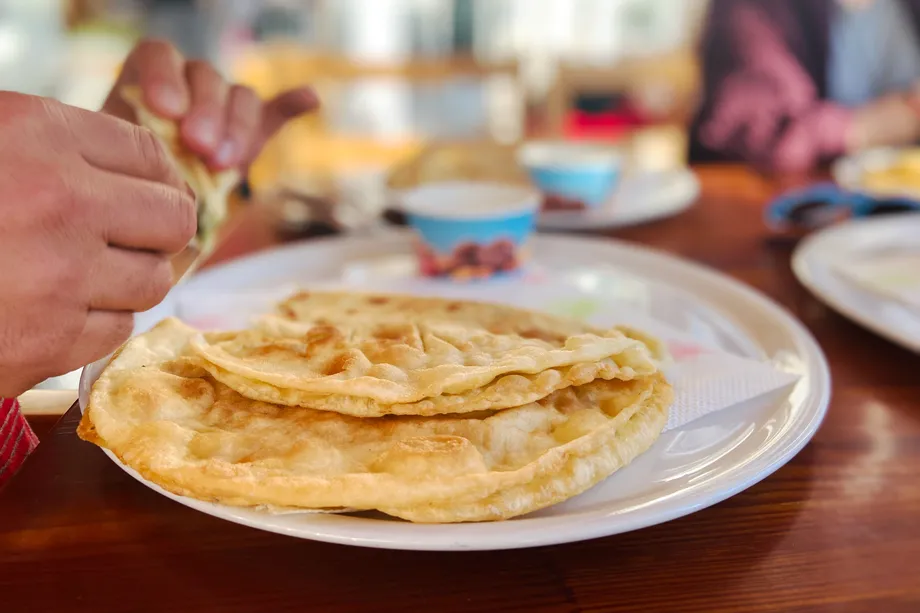There are no signs or boards to help find the Kabul-Shengjin Cafe. The small Afghan restaurant is tucked away at the south end of a five-kilometer stretch of the Shengjin Beach, in a quiet little coastal town by the Adriatic Sea in Albania. Anyone looking need only follow the aroma of fried dough and spices, and listen for the Bollywood music. This winter, when many of its neighbors were closed, the brightly lit cafe bustled with energy and life. A hand-scribbled whiteboard outside proudly declares its modest but much sought-after delicacies: bolani (stuffed fried bread), dogh (savory yogurt drink), and samosas (stuffed fried pastries).
Even with a small menu, lack of tourists, and a definite rising chill in the air, this new cafe was packed with customers dining in or waiting for their pick-up orders when I visited in December. Its success emerges from the shared tragedy of a community escaping persecution; a majority of “regular” diners at the Kabul-Shengjin Cafe, much like its proprietor, 22-year-old Walwala Jalalzay, are refugees who were evacuated from Afghanistan after the Taliban seized power in August last year.
“I hadn’t even dreamed that such a thing would happen to me, that I would lose my home, my country, separated from my family,” Jalalzay said. A recent psychology graduate and an employee with the American Council, Jalalzay became a high-value Taliban target when the insurgent group took over the Afghan capital in August. The Taliban have a history of suppressing women’s rights and restricting freedoms. Since the takeover, the group has beaten, tortured, and imprisoned many Afghans, particularly women like Jalalzay, who have worked with the Americans and other international allies.
With the help of her employers, Jalalzay was put on an early evacuation flight leaving Kabul, but as a single young woman, she was not allowed to bring any dependents. “They only counted spouses and children as dependents, not parents and siblings. I cried so much when I realized I had to leave my family,” she said. Jalalzay was brought to Albania, which is hosting nearly 3,000 Afghan refugees, of which about 1,200 are staying in Shengjin. “I still cry when I think about all that happened. I miss my mother.”
Not wanting to sit and wallow, Jalalzay was determined to make the best of her opportunity. She volunteered part-time at the refugee center, providing literacy and English-language training as well as driving lessons to fellow refugees. But that wasn’t enough; she wanted to do more with her time. “One day, I was walking by the beach and I noticed these empty shops that were closed for the season. I wondered if I could perhaps lease the space and do something with it. I know many of us here miss our Afghan food, and I thought it might be nice to book the place for a couple of days and just cook for the community here,” she said.
The owner of the space, an Albanian woman who did not wish to be named, was reluctant when Jalalzay and her business partner, Maryam Aslami, first approached her. She warned them that the cold weather would keep customers away, but Jalalzay and Aslami’s plan of serving Afghan food to the displaced Afghan community moved her. Along with giving them the space for free for four months, their benefactor also covered their utility bills. She explained to them that as someone from a country that experienced similar conflict and displacement in the 1990s, she could relate to the suffering and loss of Afghans. Jalalzay remembers her saying: “Our story is the same and I can feel your pain. I admire your resolve and want to do something for you.” And so, the cafe opened in November last year, and has been a lifeline for the Afghan refugees in the area since.
Read full story on Eater
